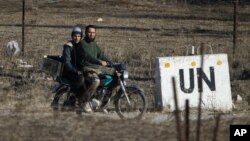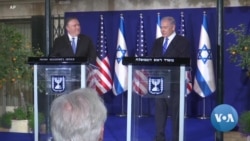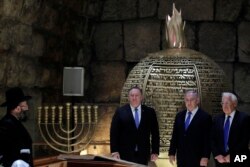President Donald Trump said Thursday the United States is recognizing Israeli sovereignty over the Golan Heights, the Syrian territory it captured in 1967's Six-Day War and has controlled since then.
Trump, in a Twitter comment, said the Golan Heights "is of critical strategic and security importance to the State of Israel and Regional Stability!"
Trump's statement came while Secretary of State Mike Pompeo was in Jerusalem, becoming the highest-ranking U.S. official ever to visit the contested Western Wall in the holy city of Jerusalem accompanied by an Israeli leader, Prime Minister Benjamin Netanyahu.
The visit possibly signaled tacit U.S. recognition of Israeli control of the Jewish holy site, but it was quickly followed by Trump's specific announcement on the Golan Heights.
WATCH: Trump: Time to Recognize Israeli Golan Heights Sovereignty
Netanyahu has accused Iran of attempting to launch attacks on Israel from the Golan Heights, saying, "I think for this reason and many more, it is time that the international community recognizes Israel's stay on the Golan, and the fact that the Golan will always remain part of the State of Israel."
The Israeli leader praised Trump's decision shortly after the president's announcement.
"President Trump has just made history," Netanyahu said after calling the U.S. leader. "The message President Trump has given the world is that the United States stands by Israel. We are deeply grateful for the U.S. support."
Last week, the U.S. State Department, in its annual human rights report, dropped the phrase "Israeli-occupied" from the Golan Heights section, instead calling it "Israeli-controlled." Pompeo told reporters the change in terminology was not accidental but rather a reflection of the reality on the ground that the Jewish state controlled the territory.
In his visit to Jerusalem, Pompeo reaffirmed the long-standing U.S. friendship and support for Israel.
Pompeo accused Tehran of seeking the "annihilation and destruction" of Israel. "With such threats a daily reality of Israeli life, we maintain our unparalleled commitment to Israel's security and firmly support your right to defend yourself," he told Netanyahu.
The Golan Heights is about 1,800 square kilometers on the northeastern edge of Israel along its border with Syria, with about two-thirds of it controlled by Israel and the remainder under contested Syrian control. There have been numerous battles over the land during the eight-year Syrian Civil War.
After the 1967 war, Israel formally annexed the territory in 1981. But the international community has not recognized that annexation and considers the Golan Heights as occupied territory.
Trump and other former U.S. leaders and top U.S. officials have visited the Western Wall privately in the past but not with an Israeli leader.
The Western Wall is located underneath the Old City's Muslim Quarter in eastern Jerusalem that was captured by the Israelis in the Six-Day War.
But for decades, top U.S. officials have refrained from visiting the site with Israeli leaders to present a sense of impartiality in deciding eventual control of Jerusalem in the years of unresolved discussions over the creation of a Palestinian state.
The Palestinians have sought to claim east Jerusalem as its capital of an eventual independent state, but Israel also considers Jerusalem as its eternal and indivisible capital.
"I think it's symbolic that a senior American official go there with a prime minister of Israel," Pompeo said. "It's a place that's important to many faiths, and I'm looking forward to it. I think it will be very special."
Pompeo and Netanyahu viewed the wall and adjacent tunnels. The two officials stopped by a visitor's center to watch a virtual reality recreation of the Jewish temple that once stood on the Temple Mount.
The Temple Mount is revered by Jews as the holiest site in Judaism, which once housed the biblical temples. It is also home to the Al-Aqsa Mosque, considered the third holiest site in Islam.
The Western Wall website says that the tour of the tunnels "allows visitors to reach the segments of the Wall hidden from view, and to touch the original and special stones that tell the story of the Jewish nation."
Pompeo's visit to the site and the recognition of the Israeli ownership of the Golan Heights could further inflame tensions between Palestinians and Israelis. The Palestinians have already severed ties with the U.S. over Washington's Jerusalem policies.
Trump, early in his administration, abandoned long-standing U.S. policy by moving its embassy from Tel Aviv to Jerusalem after recognizing Jerusalem as the Israeli capital.
When Trump did so, he said it did not determine the city's eventual borders, but Palestinians viewed the U.S. action as tipping the scales toward Israeli support and cut ties with the U.S.
Nabil Abu Rudeineh, spokesman for Palestinian President Mahmoud Abbas, criticized Pompeo's visit to Israel absent any corresponding plans to meet with Palestinian officials. "While they are claiming to be trying to solve the conflict, such acts only make it more difficult to resolve," he said.
Pompeo said, "The Israelis and Palestinians live side by side. We need to help them figure out how to do that. It's a fact, and this administration wishes well for the Palestinian people."
While in the Old City, Pompeo, a devout Christian, also stopped at the Church of the Holy Sepulcher, where tradition says Jesus was crucified and resurrected.
Pompeo visited Kuwait on the first leg of his five-day Middle East trip before heading to Israel and Lebanon, the last stop.
Pompeo met formally with both Netanyahu and Israeli President Reuven Rivlin, reaffirming U.S. support for Israel and its right to defend itself against attacks. They also discussed how best to combat what the U.S. considers Iranian aggression in the Middle East.
Trump is meeting with Netanyahu in Washington next week. Netanyahu's government is headed to a tough April 9 re-election contest as the prime minister is embroiled in a corruption investigation and faces allegations of bribery, fraud and breach of trust. Netanyahu has called the case against him a political "witch hunt."
In comments to reporters en route to the Middle East, Pompeo dismissed the suggestion that his meeting with Netanyahu could be seen as the United States intruding in the Israeli election in support of the prime minister.
A senior State Department official said last week that Pompeo would not be meeting with Netanyahu's opponents but with Netanyahu alone as the current head of the Israeli government.









